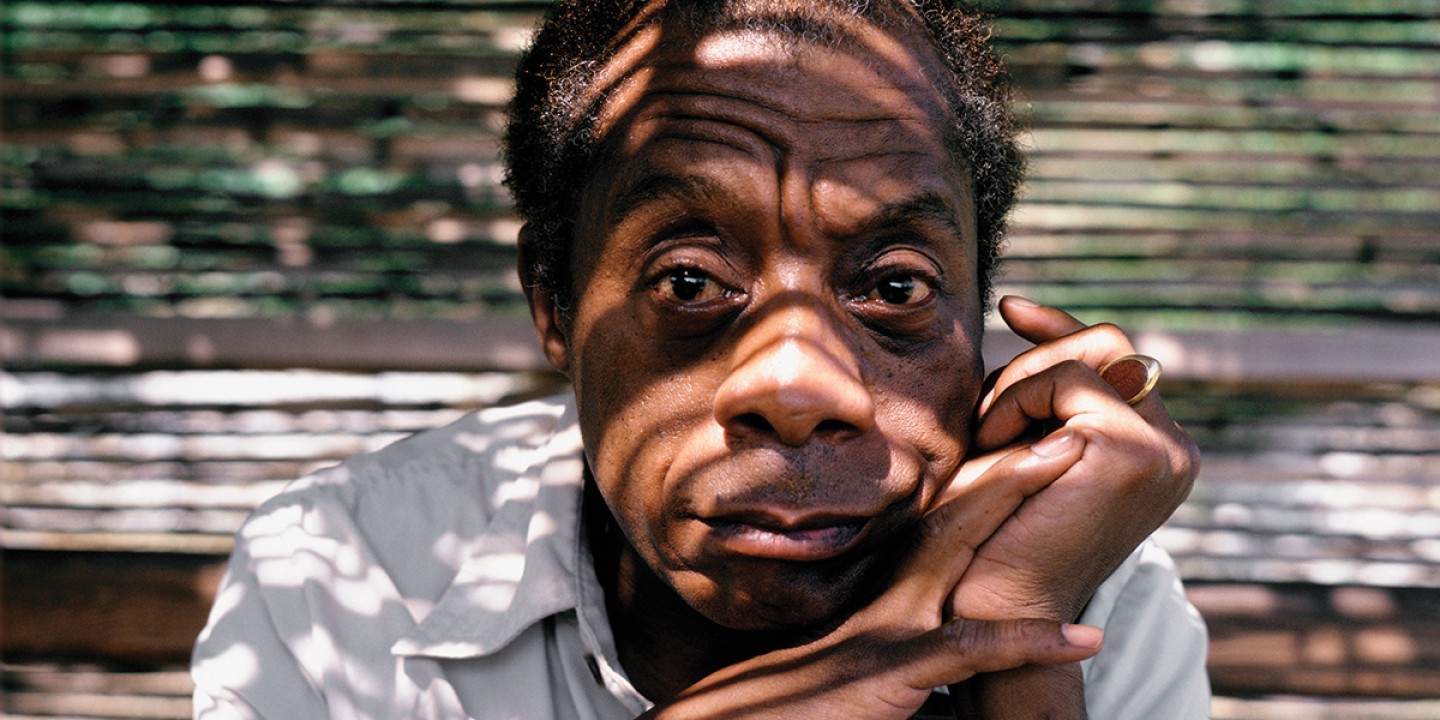
James baldwin’s memoir No Name in the Street begins, as many memoirs do, with the writer’s very first memory. He is not yet five years old. His mother says to him, “I have a good idea,” and then, looking at a piece of black velvet, she puts it away in the closet. From this inconsequential action, little Jimmy reasons that an idea is something tangible like a wad of velvet. It can be put away. Baldwin does not pursue this parable in print, but everything he writes is an act of finding and saving. Mediocre writers make allowances for losing things. But in Baldwin nothing is lost. The tangible experiences of growing up in Harlem, hating his stepfather, becoming a boy preacher, leaving the church, leaving America, learning to write, flourishing in a White man’s world, and falling in love are material ideas, with heft, feel, and duration. They are pent-up in his body. They release their own light for all to see.
Baldwin’s account of his life (in both its nonfiction and fictional versions) exposes the intersectional roots of religion, psychology, race, and sex. These are the subjects of everything he writes, and in everything he writes he is an actor. His story moves from the Pentecostal fires of Harlem to Greenwich Village, to Paris, to Switzerland, to Istanbul, and to his final home in the south of France. He is forever leaving some place or someone, but never jettisoning what came before. The church, he says in an essay titled “The Devil Finds Work,” is “carried within us” even when its form is left behind. Like a wad of cloth put away for safekeeping.
Read our latest issue or browse back issues.
His is not the spiritual memoir that begins in unbelief, crests in conversion, and ends in spiritual certainty. His life complicates that plot, as most lives do. His story begins in cyclonic belief from which he runs for his life. It ends in a whole new understanding of himself, one that is informed by the original storm, now spent. The older Baldwin is like the lover who mourns his lost love but is somehow sustained by it; he is the old man who knows that he was once full of fire and is still warmed by it.
Baldwin is not everybody’s idea of a spiritual memoirist. His never-flinching assessments of American idolatry and White Christian hypocrisy make it easy to dismiss him as a spiritual guide. But, of course, he is not a guide, he is a force. Exorcism is a historic function of the church and not without its spiritual uses. In the cauldron of 20th-century literature, Baldwin is the exorcist without peer.
In a 1968 address to the World Council of Churches, he reminded attendees that “very long ago” White Christianity separated itself from the soul and sorrow of Black religion, thereby rendering itself a split personality. With a rhetorical flourish, he wondered if the so-called Christian civilizations have the moral energy and the spiritual daring “to atone, to repent, to be born again,” if there is “enough leaven in the loaf” for the church to take its place beside the crucified Jew. Exorcism is not a gentle art. Jesus did not perform exorcisms by making friends with the demons or trying to understand them but by ripping them out and pulverizing them. But as painful as his exorcisms were, they were exercises of strenuous love and fitted to his larger hope of redemption. Ultimately, this was Baldwin’s pattern too, for, as he insisted in the same address, “we are all sons of God.”
The book that made Baldwin famous, The Fire Next Time, appeared at the height of the American civil rights movement and established him as the preeminent voice of Black American intellectualism. It was published the same year as America’s other great prophecy, Martin Luther King Jr.’s “I Have a Dream.” Its longest section is a 90-page essay, “Down at the Cross,” which first appeared in the New Yorker as “Letter from a Region in My Mind.” The essay begins, “I underwent, during the summer that I became fourteen, a prolonged religious crisis. . . . I then discovered God, His saints and angels, and His blazing Hell.”
In Baldwin’s autobiographical novel Go Tell It on the Mountain, the crisis plays out on the “threshing floor” of his stepfather’s church, surrounded by family and parishioners praying him through a long night of violent revelation. “Oh, blessed Jesus! Oh, Lord Jesus!” cries the protagonist, John. “Take me through!” In one of the most memorable sequences in American literature, Baldwin writes, “Something moved in John’s body which was not John.” The Power has cracked him open. “One is confronted with the agony and the nakedness and the beauty of a power which has no beginning and no end, which contains you, and which you contain, and which will be using you when your bones are dust.”
Nothing of Baldwin’s religious experience—both fictional and in real life—can be understood apart from the cruelty he experienced at the hands of his stepfather, a preacher, whose daily anger toward White people is “transformed into prophetic wrath” showered upon his innocent family in Go Tell It on the Mountain. His stepfather, Baldwin once wrote in an essay, “knew that he was black but did not know that he was beautiful.” His greatest fear was that James actually believed that he could do anything a White boy can do. This was death for a Black man in the White man’s world. If the Puritans trembled before an angry God, Jimmy Baldwin did the same before God’s angry surrogate, protected only by his mother’s Christlike intercessions.
In “Down at the Cross,” Baldwin remembers being engulfed by the drama and the music of a Pentecostal church in Harlem presided over by the legendary Mother Rosa Horn. How could he be a part of it? He would preach. For three years James was a “young minister” whose spellbinding sermons brought him more fame around Harlem than his father ever enjoyed. Baldwin’s later eloquence in debate and his charismatic ability to captivate secular audiences—memorably preserved in the documentary I Am Not Your Negro—he would always attribute to his original vocation as a preacher: “Nothing that has happened to me since equals the power and the glory that I sometimes felt when, in the middle of a sermon, I knew that I was somehow, by some miracle, really carrying, as they said, ‘the Word’—when the church and I were one.”
By the time Baldwin was 17, he was a recovering boy preacher, cooling off like a spent volcano. The extravagance of Black church dramatics was beginning to weigh on Baldwin. It promises too much later but not enough now. If the Lord really cares for the downtrodden, why doesn’t he do something about it?
Another preacher, quite unlike his father, would help Baldwin answer the question. But not before repeated sojourns in Paris, a chalet in the Swiss Alps where he wrote Go Tell It on the Mountain, and a semipermanent residence in Istanbul. When the campaign to integrate American schools prompted violence against Black children in the South—first spitting and then fire hoses, bombs, and dogs—it was time for the expat to go home. In the South, which was to him another foreign country, he sensed a terrible fatalism among both Black people and White people, who understood that they were locked in an inextricable embrace.
Of Montgomery, Alabama, the former capital of the Confederacy, Baldwin observes, “I have never been in a town so aimlessly hostile, so baffled and demoralized.” On a journalistic assignment, he entered a Whites-only restaurant. “Every white face turned to stone: the arrival of the messenger of death could not have had a more devastating effect than the appearance in the restaurant doorway of a small, unarmed, utterly astounded black man.” Shooed around to the rear entrance, he found a dingy cubicle with one electric light and a counter with five stools. A window faced into the back of the White counter, with wire mesh covering the opening. He could see the White customers through the grill, but they could not see him. He ordered a hamburger but couldn’t eat it. He tossed it into the weeds on his way out. Frightened, he was determined to get his story without becoming one.
The first time Baldwin visited Martin Luther King’s church in Montgomery, he expected to meet the stereotypical Black preacher whose “stunning, demagogic” flights of rhetoric would bring a congregation cheering to its feet. He expected a performer like the ministers he knew in Harlem, perhaps a man like his stepfather, who knew how to pull all the levers in the pulpit. Instead, he found a man who held the reins of that power but harnessed it and kept it within bounds. He met a man who possessed intimate knowledge of the people sitting before him and spoke movingly of the things that hurt them and threatened their self-respect. A prophet who absorbed the weariness and anger of common people and then gave it back to them in heightened, even transcendent language. A pastor who, at the center of the defining moral crisis of the era, maintained the moral balance between wrongs committed and wrongs received. Most important to Baldwin, King always told the truth, whether to Black or White audiences, a virtue Baldwin claimed for himself as well.
Meeting King was a turning point for Baldwin. He resolved to engage the battle for civil rights in his chosen field, the written and spoken word. He had already learned from his stepfather’s example the futility of hate. Now he sought another way—what King called “the weapon of love.” Like King, he would thread a path between beautiful words and armed resistance. In an image that resonates in our day with the murder of George Floyd, Baldwin condemned the “hater whose foot is on your neck.” Later, in Birmingham, Baldwin used the same image, this time citing the photo of a policeman with his foot, literally, on a woman’s neck.
Baldwin went on to advocate the “great spiritual resilience” needed to resist such hatred: “I am very much concerned that American Negroes achieve their freedom here in the United States. But I am also concerned for their dignity, for the health of their souls, and must oppose any attempt that Negroes may make to do to others what has been done to them.”
In the opinion of his critics, Baldwin spoke too trustingly of love. Like King, he advocated for love in all the wrong places and injected it into conflicts where it had no relevance. Like King, he often defined love by saying what it is not: “I use the word ‘love’ here not merely in the personal sense but as a state of being, or a state of grace—not in the infantile American sense of being made happy but in the tough and universal sense of quest and daring and growth.”
While King’s ministry did not bring Baldwin back to church (or back to his native country), it restored a hope that had been lost to him, namely, as he puts it in Notes of a Native Son, that “the fight” begins in a heart freed of hatred and despair.
But if we fail to exorcise the hatred that rages among us, well, then we must reckon with the warning in the old spiritual: “God gave Noah the rainbow sign / No more water, the fire next time!”
This article is adapted from Our Hearts Are Restless: The Art of Spiritual Memoir, published this month by Oxford University Press. Used with permission.
* * * * * *
Jon Mathieu, the Century's community engagement editor, discusses this article, James Baldwin, and memoir with author Richard Lischer.





